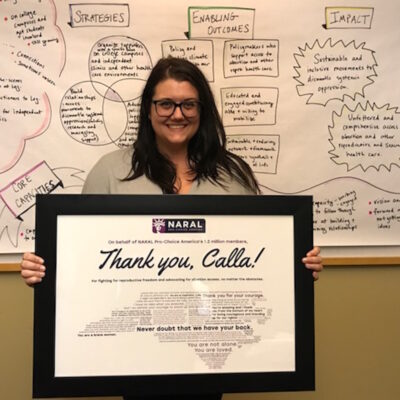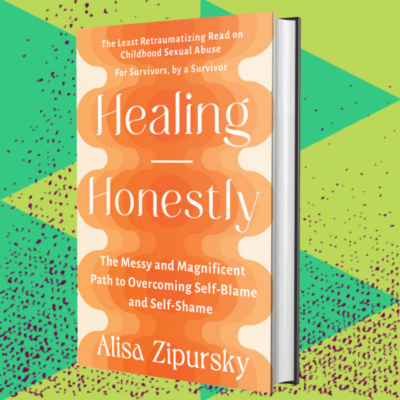This story describes does not describe sexual violence but does describe the effects of trauma, including re-traumatization.
On June 26, 2017, four months before the “me too” campaign reignited, Cosmopolitan.com published the story of Calla Hales’ rape in an article titled, “She Told a Guy She Worked at an Abortion Clinic. On Their Next Date, He Raped Her.” No one, including Calla, could have predicted the vitriol directed at her from FOX News, the anti-choice movement (which claims Calla made up her rape as a part a pro-choice agenda), journalists, and even some feminists, all for opening up about her experience.
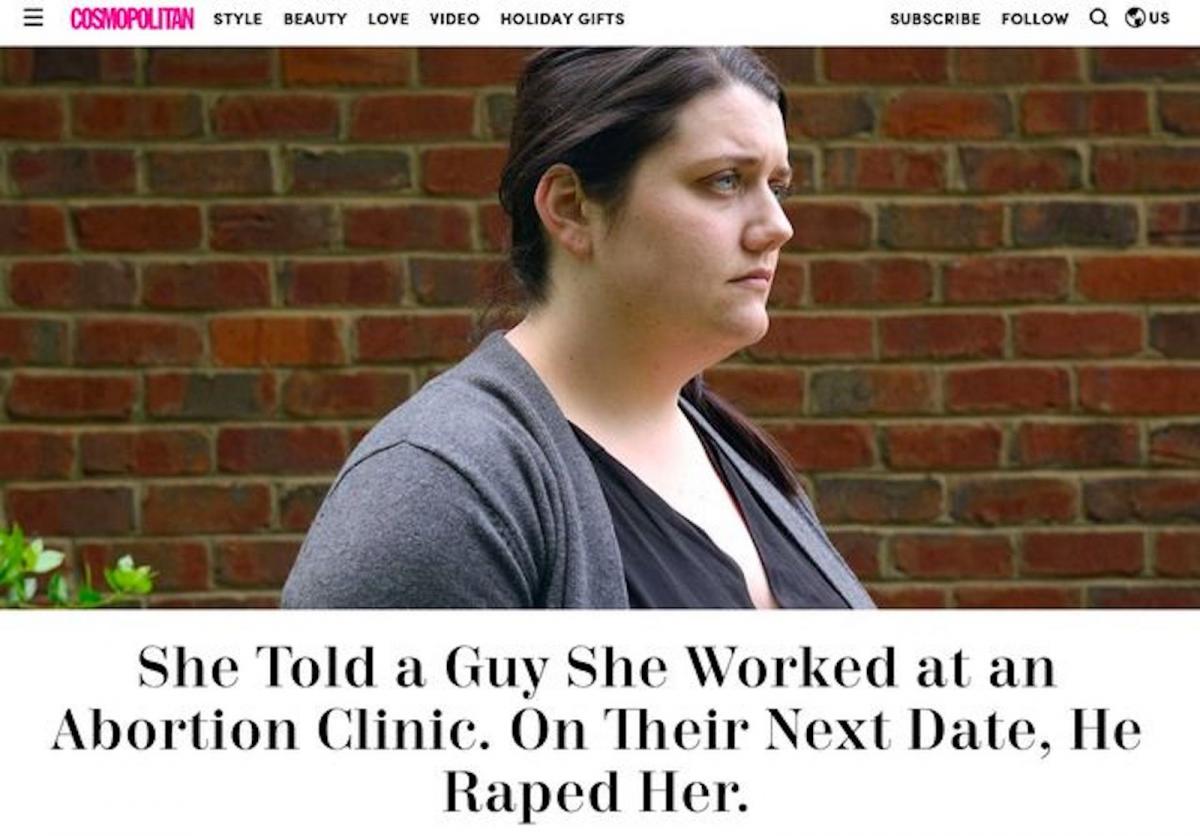
While extraordinary progress has been made in the past two months to make it safer for survivors to speak out, it was just seven months ago that Calla risked her safety to speak her truth. Here, Calla tells us, in her own words, what it was like to have her rape reported on and to subsequently have her character attacked, what she thinks has changed in the past seven months, and how she finds resilience to move forward as a director of an abortion health center, as a survivor, and as a woman in fear for her safety.
Calla and I met on Twitter, when I reached out after her story was published. While most of the internet is hot garbage, I must admit the gift of her friendship is possible because of it. She is the best and we have both found infinite support and joy from our friendship. The internet can be pretty cool sometimes.
In the past eight weeks, we have experienced a flood of survivors’ voices being heard and believed, and real consequences for some perpetrators. It was only seven months ago that Cosmo published the story of your rape, yet the way you were treated in the media and larger society was completely different from what we are seeing now.
I am thankful that others feel supported enough to speak out about their assaults, and I commend them for their bravery and send them so much love. I hate the fact that survivors had to shoulder this burden to expose their own pain in order to create change. There is a small part of me that’s angry that my pain somehow wasn’t enough for people to accept. I also am struggling with re-traumatization, and am thankful that I have found some incredible sources of support over the past year.
I’ve always fancied myself as a strong, independent woman, and I thought I’d be able to brush off a lot. The fact is I am a strong and independent woman, and not being believed still fucking hurt.
I don’t know if Cosmo released the article now, instead of seven months ago, I would have gotten a different response. While public support around sexual assault and rape has increased, so have the anti-choice attacks around abortion on cultural, legal, and physical levels, and so much of the backlash I’ve experienced is specifically because of the role abortion played in my story.

The idea of re-traumatization is confusing, especially for people who aren’t survivors. We go through enormous obstacles to speak out, and when we share our story it can make us feel our trauma all over again, even after years of healing from the initial trauma. What’s been your experience with re-traumatization?
It’s been difficult. Some days, the aftermath of the attack and new waves of anonymous hate feel worse than the attack itself. For me, the physical pain ended, but the emotional trauma didn’t.
You said something to me the a few months ago that I couldn’t shake. You said that you, at times, feel guilty for speaking out, because other survivors are being re-traumatized by simply witnessing the way you’ve been treated.
I do feel guilty sometimes. Not everyone is in a place to hear about details of sexual assault. For example, I know that I can no longer watch “Law and Order: SVU”. Hell, listening to the telltale “dun dun” at the beginning of the episode fills my stomach with dread. Though the Cosmo article was great about providing detail without creating a hostile situation for readers, it may trigger someone who’s not ready to read it. I worry about that sometimes. The only thing I can do though is actively acknowledge that I’m an email/text/tweet away if support is needed.

Your and my stories are very different from one another, but a core similarity I think all survivors share is a fear that we will not be believed by friends and families, the police, the courts, or the community around us.
The fear of not being believed is absolutely something I worried about. I vividly remember not being as supportive as I should have been in college when a classmate was raped. I know how easy it is to slip into that immediately questioning mindset, to poke at muddy waters in hopes of finding clarity.
When I told my story, I questioned who would really even care that it happened because, as it stands, there are some folks that really hate me because of my job as the administrator of a health center that provides abortions. It’s unfortunate and I hope that there’s a cultural shift, but at the time of my attack and in this moment, it’s reality.
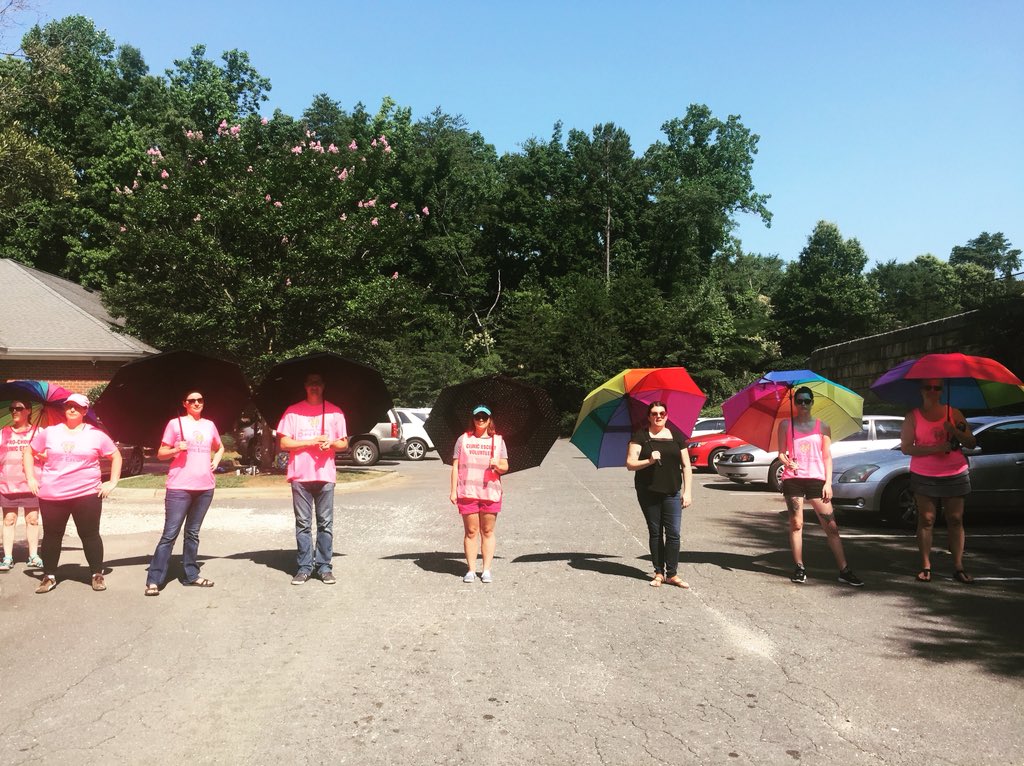
I’ve always fancied myself as a strong, independent woman, and I thought I’d be able to brush off a lot. The fact is I am a strong and independent woman, and not being believed still fucking hurt.
I know, as survivors, we all have complex relationships with speaking out. What did that decision feel like for you?
It was absolutely petrifying. I had a lot of conflicting emotions about it, and some days, I still worry if I made the right call. A lot of my anxiety centers around how this story would affect my family and friends — would they still love me when they found out? Would they believe me? Would they abandon me?
Admittedly, I sometimes question if all the pushback I’ve received is worth it. The answer is always yes – even if survivors may not be engaging with me, they know I support them and that they’re not alone.
When the request for the Cosmo interview came in, it had been almost two years since the attack, and I felt that I had made significant progress in my healing. Despite this progress, the first thing I thought about when considering the request were the relationships that I had lost in aftermath of the attack. I initially balked at the idea of an interview; I didn’t want to risk the new support and stability I had found. But the more I thought about it, the more I realized that telling my story could help me heal.
Why was telling your story important to you?
In all honesty, I’m sick of being beholden to this event. I’m sick of it owning my life, my emotions, my relationships. It happened to me, but it doesn’t have to define me. The past two years have been a very turbulent journey to get to this point in my life, but they have brought me to the realization that it wasn’t my fault. My goal was, and still is, to help survivors realize they aren’t alone, and that they are worthy of love and support.
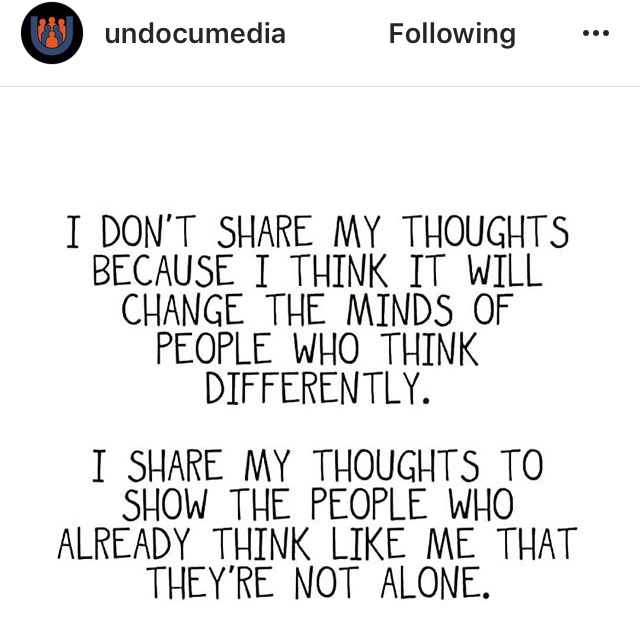
What has been the hardest part?
The hardest part has been ignoring the trolls. I know, it’s so easy to say, “Don’t read the comments,” but when it’s your personal life that’s being picked apart, it’s hard not to look. To see comments that say, “You’re too fat and ugly to be raped,” “You deserved it, baby killer,” and “You know you wanted it, you attention whore” can really mess with your head. Some days, I feel angry and confrontational. Other days, I question my existence — am I too fat, too ugly to be loved? Did I deserve it or give him some unconscious body language that led him astray? Most days, however, I ask myself what Chrissy Teigen would do and carry on throughout the day.

When you and I were talking about having this public conversation, what was important to me was not refuting all the insane criticisms people had of your story, because we know that even if we refuted all the claims made against you, people would have simply found some other way to poke holes in your story.
This is what happens to survivors every single time we speak out. Rape is an underreported crime. Women do not “cry rape”. These are facts. Yet, our stories get torn apart in a way that no other victim of a crime does. We get blamed for our crime. Either because we could have avoided the rape, or if we couldn’t avoid it then we could’ve fought the rape off, or if we couldn’t fight the rape off we could have reported it to the police, or if we reported it to the police we could have behaved in a different way the way that you think a survivor should behave. And if we do all those things “right”, so many people still will not believe us.
It has been an absolute struggle not to refute every piece of trash I’ve gotten. That’s just my personality- I know I can be brash, sarcastic, and defiant. At the end of the day, I know that I provided Cosmopolitan with every record I had in my possession, with multiple contacts for interviews, and with my own excruciatingly thorough narrative. I know that I went through multiple fact checks, most of which ended in my own panic attacks and tears. If that’s not enough for the Federalist, Fox News, or Daily Beast, then fuck them- I owe them nothing.
There is no perfect rape. There is no perfect victim. There may be similar threads when two assaults are compared, but no person is the same. It’s incredibly damaging for survivors to have deal with this imagined idea of what a rape or rape survivor “should” look like and to know that they will never fit this impossible and fake standard.
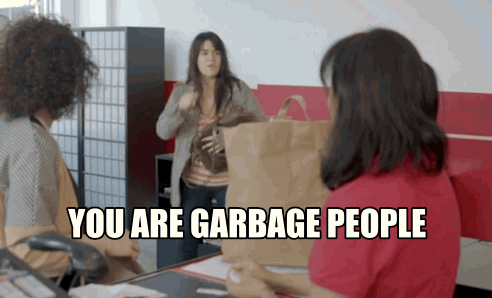
I want to talk about your security concerns. Preferred Women’s Health Center, where you are an administrator and co-owner, has been the target of some of the most aggressive anti-choice actions we have seen in the country, including cyber attacks, barricading patients from accessing the building, and violent threats against you your staff. Have those security concerns changed since the publishing of the piece?
Security concerns have changed, and not in ways I imagined. I already had some security protocols in place, but I’ve recently started getting recognized in public. It’s a little terrifying to have a stranger walk up to you and say, “Hey, are you Calla Hales? You work at Preferred Women’s Health Center?” I never know how the conversation is going to go — I’ve had both positive and negative encounters start like that.
The worst encounter I’ve had was when a little girl, probably no older than six, came up to me while I was in line at a bagel store, tugged on my hand and asked me if I was a “lying slut.” The young girl was with two older men who recognized me and she had overheard their conversation. It was so hard to stay in line and not cry; everyone around me had overheard the conversation, but no one wanted to acknowledge it. It was this suffocating silence.
The most entertaining instance was when a woman thanked me for sharing my story while I was in Lush buying anti-chafing powder.

You and I come from the abortion rights movement, and also are outspoken sexual violence survivors. It’s so crazy to me that we, culturally, have separate conversations about sexual violence and reproductive rights as though they are independent, unrelated questions. Your story means so much to me for so many reasons, including that it demonstrates that whether are talking about rape or about abortion access, we are asking the same question: Who is trying to control our bodies and why?
I’m grateful to know that my story has impacted you. Your honesty and openness about your experiences has influenced how I’ve told my story and moved forward with media, so I’m doubly humbled. I agree: sexual violence and organizing against reproductive freedom are both about control. Specifically, they’re about how to take control away from repressed, marginalized, and minority bodies.
It’s hard knowing that I was targeted because of my work. It happened because a man felt threatened by a woman’s autonomy. I’ve experienced a lot of hate in my profession, but this type of intimate attack was unexpected. I never imagined a situation like this, ever.
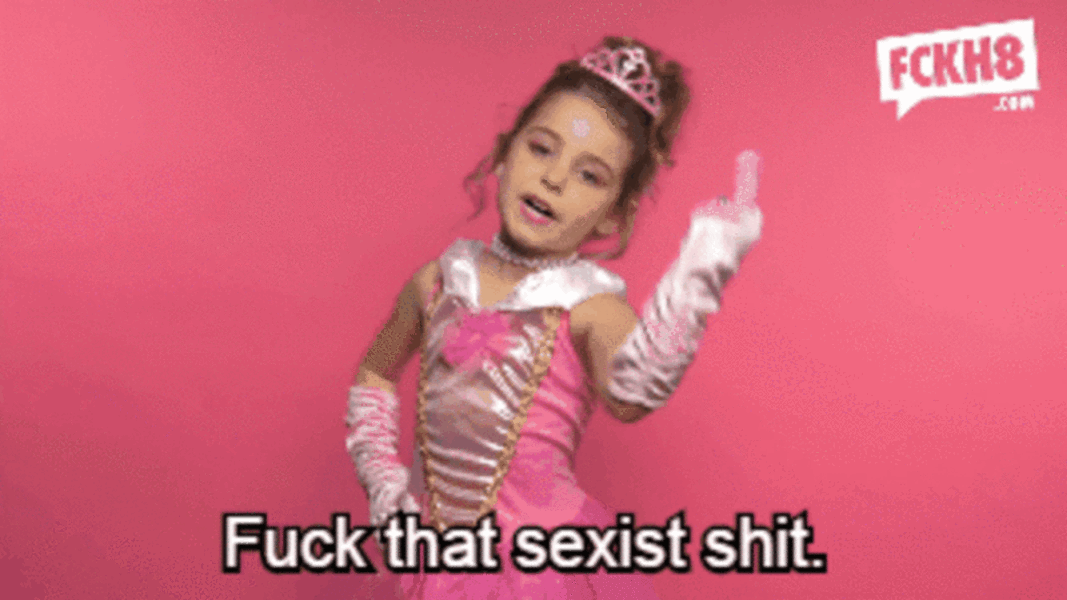
You and I have talked about how I’ve just learned to love baths but you are like six months ahead of me in the journey of having like really great baths. In addition to said baths, how are you taking care of yourself these days?
Hi, my name is Calla, and I’m a Lush bath bomb addict. In seriousness, I’m pretty bad at self-care. I’m really great at throwing myself into projects and keeping myself so busy that I can’t really dwell on the things bothering me. It’s something I’m actively trying to be better at. Right now, this means attempting a better schedule of diet and exercise, trying to sleep more, and seeing my therapist regularly.

You and I have talked a lot about how, when dealing with something as stigmatized as sexual violence, we have to assume that we are reaching thousands of people who need to hear what we are saying, even if we don’t actually hear from them. Have you been hearing from fellow survivors, if yes, what is that like for you?
This is such an important question. I have had a few folks reach out, like you, and be actively supportive as other survivors. However, it’s probably a lot less than people think. That doesn’t make this support any less valuable. Admittedly, I sometimes question if all the pushback I’ve received is worth it. The answer is always yes – even if survivors may not be engaging with me, they know I support them and that they’re not alone.
If you could communicate one thing to fellow survivors, what would it be?
It is not your fault.
What’s the one thing you’d most like to say to people who aren’t survivors?
It’s hard to know how to support survivors. Sometimes it’s best to simply say, “I have no idea how to help you or support you like you need right now, but I want you to know I’m here, I love you, and I want to try.”
I believe that telling our stories is an act of healing and resistance. Thank you for all that you do and for sharing your words with us.
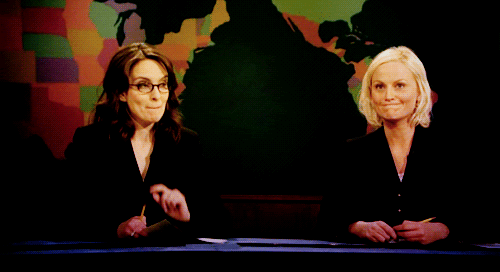
The abridged version of this interview was originally published on BUST.
If you are a survivor and would like to tell your story here, don’t hesitate to email me at Alisa at HealingHonestly dot com.
